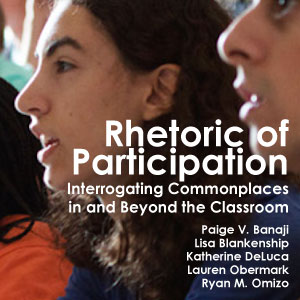Welcome to the second installment of the Crowdsourcing with CCDP blog series! As we discussed in our first installment, this Scholar Electric series celebrates CCDP readers. Especially, it showcases the ways in which our readers have taken inspiration from CCDP publications, carrying our authors’ ideas into a variety of spaces. We are featuring in our Scholar Electric blog pedagogical documents–like lesson plans, activities, and assignments–that were inspired by CCDP publications.
 The Rhetoric of Participation: Interrogating Commonplaces In and Beyond the Classroom was inspired by the work of the late Dr. Genevieve Critel. In a recent interview with CCDP Digital Fellow Charles Woods, co-editors Paige V. Banaji, Lisa Blankenship, and Katherine DeLuca describe the way in which Dr. Critel, as their graduate instructor, carried her scholarship into the classroom. In The Rhetoric of Participation, Dr. Critel’s former students carried her ideas into their scholarship. As Lisa Blankenship shared with Charles,
The Rhetoric of Participation: Interrogating Commonplaces In and Beyond the Classroom was inspired by the work of the late Dr. Genevieve Critel. In a recent interview with CCDP Digital Fellow Charles Woods, co-editors Paige V. Banaji, Lisa Blankenship, and Katherine DeLuca describe the way in which Dr. Critel, as their graduate instructor, carried her scholarship into the classroom. In The Rhetoric of Participation, Dr. Critel’s former students carried her ideas into their scholarship. As Lisa Blankenship shared with Charles,
 I think there are just so many
directions you can take this work. And I’m so pleased that this is a
legacy coming from her work and life.
I think there are just so many
directions you can take this work. And I’m so pleased that this is a
legacy coming from her work and life.
In our second showcased piece, Steven J. Corbett and his students Amanda Bender, Emily Simon, and Jackii Ingros forge two more links in this chain of inspiration. Corbett brings ideas from The Rhetoric of Participation into his upper-level Writing and Rhetoric course. He and his students co-wrote and compiled a unique pedagogical document: a narrative about the course, penned by participants. Check out Corbett’s description of this co-authored piece below, followed by a link to the full document! And if you have an activity inspired by a CCDP title, we’d love to hear from you. Please contact CCDP Digital Fellows Savanna Conner (savanna.conner@asu.edu) and Mandy Olejnik (olejnimr@miamioh.edu) to submit assignments and ideas.
Woods, Charles. (2020, April 13). What does it mean to participate? Computers and Composition Digital Press. https://ccdigitalpress.org/blog/2020/04/13/what-does-it-mean-to-participate
Peer Pedagogies: Curricular Adventures in Peer-Centered Writing, Speaking, and Learning
Steven J. Corbett, University Writing Center Director and Associate Professor of English, Texas A&M University - Kingsville
with Amanda Bender, Emily Simon, and Jackii Ingros, George Mason University
Peer Pedagogies, because it narrates a course experience from four different perspectives, is an extensive document. We encourage you to read it in its entirety here. Below, find Corbett’s explanation of that document—how it was inspired by The Rhetoric of Participation, his experience working with student-participants, and what each part of the document offers.
We are delighted you’re joining us as we reflect back on our Spring 2015 term together at George Mason University. Peer Pedagogies is designed to walk fellow teachers of writing and rhetoric day-by-day through a course centered on peer-to-peer writing, speaking, and learning.
Readers will follow a peer writing group of three students—Amanda Bender, Emily Simon, and Jackii Ingros—and their instructor (Steven Corbett) through a sixteen-week semester of an upper-level course designed for Writing and Rhetoric majors and minors, “Situational Rhetoric: Writing and Speaking with Purpose and Passion.” During the journey, we will offer a detailed narrative unpacking of the course syllabus, all assignments, and a day-by-day enactment of the course and curriculum. Readers will see and hear the first-hand thoughts and reflections of all four participants.
Our resource is inspired by the multimodal richness of the Computers and Composition Digital Press collection The Rhetoric of Participation: Interrogating Commonplaces In and Beyond the Classroom. Themselves inspired by Genevieve Critel’s 2012 dissertation “Investigating the Rhetoric of Student Participation: Uncovering and Historicizing Commonplaces in Composition Studies” editors Paige V. Banaji, Lisa Blankenship, Katherine DeLuca, Lauren Obermark, and Ryan Omizo write: “Perhaps the central lesson from Critel’s research is that participation, as a performed act, an assessed category, and an ongoing expectation in academic and public spheres, is complicated, undertheorized, and often messy.” The editors draw on Critel’s four commonplaces of participation—community, assessment, embodiment, and technology—to theorize and organize the chapters of their collection.
Our own contribution here, touches upon all four of Critel’s commonplaces, especially in relation to students’ perspectives on participation. For example, the extensive reflections offered by the students in our course—Amanda, Emily, and Jackii—details overlapping points of view expressed by students in the Rhetoric of Participation chapter “A Curation of Student Voices on Participation in the Writing Classroom” by Lauren Obermark. Amanda, Emily, and Jackii join the curated chorus of students Obermark interviewed—in terms of motivation, effort, connection, comfort-level, support, and identity—in their own unique ways.
Our resource guides readers through all peer-centered aspects of the course, including peer review and response, in narrative fashion. It is divided into five chapters/units that revolve around our collaborative interactions on the course’s major assignments and activities.
Chapter 1
Beginning Well: Taking the Time to Get to Know Each Other
Chapter 2
Whispering Words of the Self and Others (Loud and Clear): Major Paper One
Chapter 3
Keep Calm and Love Rhetorical Analysis: Major Paper Two
Chapter 4
Communicating the Rhetoric of an Important Topic or Idea in Your Field: Major Paper Three
Chapter 5
Ending Even Better: Debates and ePortfolios
The Appendices offer the full syllabus and course calendar, all assignments, and several other course documents.
We hope you enjoy hearing about our adventures together in the writing and speaking classroom!
Link to full PDF document housed in Google Drive